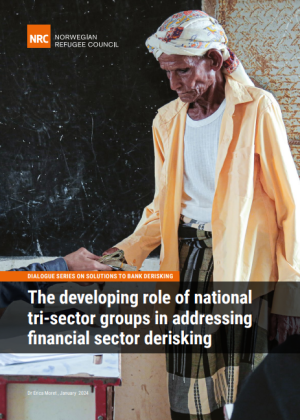Download Resources - English
The developing role of national tri-sector groups in addressing financial sector derisking
Several national tri-sector groups have been established over the past decade to enhance dialogue and problem solving between international non-governmental organisations (NGOs), financial institutions and governments. They focus on ways to reduce barriers to humanitarian assistance while ensuring economic resources are not made available to third parties in violation of counterterrorism (CT) legislation and domestic or international sanctions.
This report is the fourth in a series examining potential solutions to bank derisking and is based on the outcome of an expert dialogue held in September 2023. The dialogue brought together representatives from all current national tri-sector groups, as well as those in the process of being established.
The consultation focused on capturing best practices among tri-sector groups, exploring the scope for bridging work across national tri-sector groups, and generating recommendations to support the creation of new tri-sector groups. The discussion also aimed to identify opportunities to put into practice the recommendations stemming from the first three workshops in the dialogue series on 1) safeguarding humanitarian banking channels, 2) NGOs’ use of money or value transfer services (MVTS), and 3) the role of digital technologies humanitarian fund transfers.
The report finds:
- A variety of stakeholders should be represented and consulted within tri-sector groups, including NGOs, governments and relevant line ministries, development banks and private sector actors.
- Successful tri-sector groups are often characterised by trust and equal representation, accountability, adequate resourcing, independence, defined roles, and support for applied research.
- Tri-sector groups have a role in supporting the implementation of recommendations identified in the previous three dialogues to address bank derisking, including by:
- Considering how sanctions design could be adjusted to anticipate and mitigate their potential impacts on humanitarian banking channels.
- Supporting NGOs’ use of MVTSs and collectively engaging with relevant actors, such as the Financial Action Task Force, who discourage these money transfers modalities.
- Strengthening the role of digital technologies for remitting domestic and cross-border humanitarian fund transfers through dialogue, awareness raising and bolstering capacity.
Facilitating interactions between national tri-sector groups to share best practices, avoid replication, pool expertise, and facilitate knowledge sharing on potential solutions.
